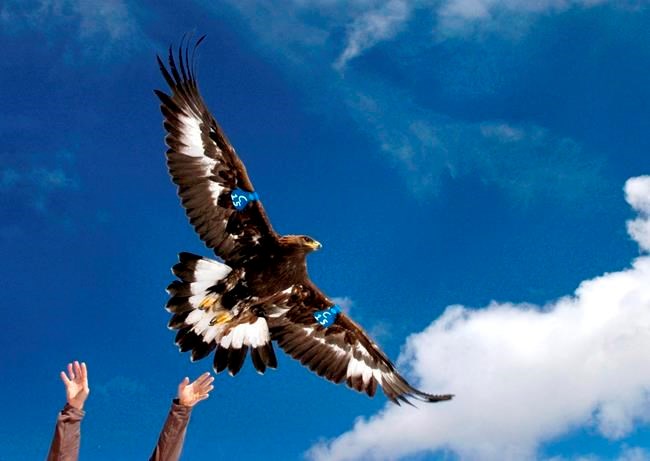A Washington state man accused of helping kill more than 3,000 birds — including eagles on a Montana Indian reservation — then illegally selling their feathers intends to plead guilty to illegal wildlife trafficking and other criminal charges, court documents show.
Federal prosecutors say Travis John Branson and others killed about 3,600 birds during a yearslong “killing spree” on the Flathead Indian Reservation and elsewhere. Feathers from eagles and other birds are highly prized among many Native American tribes for use in sacred ceremonies and during pow-wows.
Branson of Cusick, Washington, will plead guilty under an agreement with prosecutors to reduced charges including conspiracy, wildlife trafficking and two counts of unlawful trafficking of eagles, according to court documents. Court filings do not detail how many birds he will admit to killing.
A second suspect, Simon Paul of St. Ignatius, Montana, remains at large after an arrest warrant was issued when he failed to show up for an initial court appearance in early January. Paul could not be reached for comment Tuesday and his attorney, Dwight Schulte, declined comment.
The defendants allegedly sold eagle parts on a black market that has been a long-running problem for U.S. wildlife officials. Illegal shootings are a leading cause of golden eagle deaths, according to a recent government study.
Immature golden eagle feathers are especially valued among tribes, and a tail set from one of the birds can sell for several hundred dollars apiece, according to details disclosed during a separate trafficking case in South Dakota last year in which a Montana man was sentenced to three years in prison.
A grand jury in December indicted the two men on 15 criminal charges. They worked with others — who haven't been named by authorities — to hunt and kill the birds and on at least one occasion used a dead deer to lure in an eagle that was killed, according to the indictment.
Federal officials have not said how many eagles were killed nor what other kinds of birds were involved in the scheme, which they say began in 2015 and continued until 2021. The indictment included details on only 13 eagles and eagle parts that were allegedly trafficked by the defendants.
Branson, who was released from custody following a Jan. 8 court appearance, did not immediately respond to a message left at a publicly listed phone number for him. His attorney, Assistant Federal Defender Andrew Nelson, declined to comment on the plea agreement.
Text messages obtained by investigators showed Branson and others telling buyers he was “on a killing spree” to collect more eagle tail feathers for future sales, according to the indictment. Prosecutors described Paul as a “shooter" and "shipper” of eagles for Branson.
Bald eagles are the national symbol of the United States, and both bald and golden eagles are widely considered sacred by American Indians. U.S. law prohibits anyone without a permit from killing, wounding or disturbing eagles or taking any parts such as nests or eggs. Even taking feathers found in the wild can be a crime.
Federally recognized tribes can apply for permits with the U.S. Fish and Wildlife Service to take a bald or golden eagle for religious purposes, and enrolled tribal members can apply for eagle feathers and other parts from the National Eagle Repository. But there’s a lengthy backlog of requests that eagle researchers say is driving the black market for eagle parts.
Matthew Brown, The Associated Press


